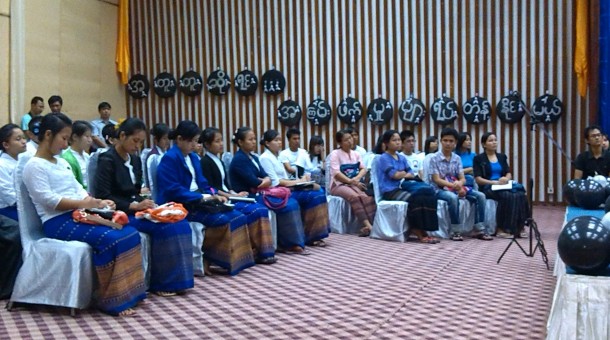RANGOON—Several hundred civil society workers and community members gathered in Rangoon for the second year in a row to mark the international day to end violence against women on Friday. Some called on the government to introduce new initiatives that would help end domestic violence and support women’s education and empowerment.
About 300 people attended the event at the Myanmar Information Technology Park, which included speeches, education videos and a short play about women’s rights. Wearing white shirts and other symbols of the international White Ribbon campaign, participants sang songs about ending domestic violence and some distributed pamphlets, videos and CDs with campaign messages to the public.
The White Ribbon campaign was organized by Burmese civil society groups Thingaha and the Comprehensive Development Education Center, and aims to empower and educate women, while teaching men to respect women’s rights, said Billy Kan Myat, Thingaha’s program coordinator.
“I am very happy to see more people are participating in [this year’s] campaign. This is a sign that our movement can help stop domestic violence,” said Kaythi, program director of the Comprehensive Development Education Center.
Aung Myo Min, from Chiang Mai-based advocacy group Human Rights Education Institute of Burma, said Burma’s policies to protect women’s rights and support women’s development remained weak.
The government, he said, should implement new measures that offer broad support for women’s empowerment and rights, while the government-affiliated Myanmar Women’s Affairs Federation should launch “a big campaign” to encourage “education for all women.”
Aung Myo Min said he was glad to see that hundreds of people had come out in support of the campaign, including a large group of men. “It is important to have peace in our community. We all have a duty to stop domestic violence,” he said. “I want to see no more discrimination [between men and women].”
It was only the second time that the annual White Ribbon day event was organized in Burma, as such public civil society events—which are common throughout the rest of the region—were previously banned by the government.
As Burma’s reform process gets underway and its nascent civil society sector expands, these events and campaigns, which often seek to advocate and educate for social, health and human rights issues, are set to become more frequent.

















